
This week, we’ll cover a number of studios whose work dotted the screens of early television. Most prominent is the television work of Terrytoons. But we’ll also have room for contributions by Q.T. Hush, Alvin and the Chipmunks, Beany and Cecil, and Roger Ramjet.
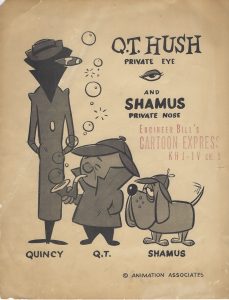 The Carnival Caper (Q.T. Hush – Animation Associates, 1/14-25/61) – Q.T. Hush was a little bulb-nosed man in a trench coat and smoking a bubble pipe, whose occupation was Private Eye. Shamus, his “wonder dog”, was billed as a “Private Nose”. Their ten-part serialized adventures opened with them walking quietly along a dark alley, as they are narrowly missed by a flying dagger, carrying a message on it with the series title, and a blinking “eye” next to Q.T.’s private-eye billing. We have yet another situation in this set of installments where carnival and circus elements are combined for a story. The T.P. Barnringle circus/carnival has the usual run of accidents, lawsuits, and sabotage, and Colonel Barnringle has no suspects. He calls in Q.T. to dig up a few, with the approval of his ringmaster Rico. Q.T. Tells Shamus that with the wide variety of “corny carneys” around here, they’d better move fast. Speaking of fast, however, Shamus has eyes for a “Dipsy Doodle Bug” coaster ride. Q.T. sees no reason why thay can’t mix business with a little pleasure – but when the bumpy ride is over, Q.T. has disappeared from his seat. Shamus scours the grounds for clues, finally finding his way into the big top. There, the Ringmaster announces the act of Flamo – a high-diver, who will dive 201 feet into a tank of flaming oil. A voice on the platform above indicates Flamo is ready. But above, it is a tied and gagged Q.T. that stands at the edge of the platform, while a hooded figure prods him at knifepoint to jump. Shamus obtains a fire extinguisher in the nick of time, dousing the oil with retardant foam just as Q.T. plunges into it. Somehow surviving in spite of what must be continued extreme heat within the tank, Q.T. thanks Shamus for quick thinking, and Shamus comments that the case is really heating up.
The Carnival Caper (Q.T. Hush – Animation Associates, 1/14-25/61) – Q.T. Hush was a little bulb-nosed man in a trench coat and smoking a bubble pipe, whose occupation was Private Eye. Shamus, his “wonder dog”, was billed as a “Private Nose”. Their ten-part serialized adventures opened with them walking quietly along a dark alley, as they are narrowly missed by a flying dagger, carrying a message on it with the series title, and a blinking “eye” next to Q.T.’s private-eye billing. We have yet another situation in this set of installments where carnival and circus elements are combined for a story. The T.P. Barnringle circus/carnival has the usual run of accidents, lawsuits, and sabotage, and Colonel Barnringle has no suspects. He calls in Q.T. to dig up a few, with the approval of his ringmaster Rico. Q.T. Tells Shamus that with the wide variety of “corny carneys” around here, they’d better move fast. Speaking of fast, however, Shamus has eyes for a “Dipsy Doodle Bug” coaster ride. Q.T. sees no reason why thay can’t mix business with a little pleasure – but when the bumpy ride is over, Q.T. has disappeared from his seat. Shamus scours the grounds for clues, finally finding his way into the big top. There, the Ringmaster announces the act of Flamo – a high-diver, who will dive 201 feet into a tank of flaming oil. A voice on the platform above indicates Flamo is ready. But above, it is a tied and gagged Q.T. that stands at the edge of the platform, while a hooded figure prods him at knifepoint to jump. Shamus obtains a fire extinguisher in the nick of time, dousing the oil with retardant foam just as Q.T. plunges into it. Somehow surviving in spite of what must be continued extreme heat within the tank, Q.T. thanks Shamus for quick thinking, and Shamus comments that the case is really heating up.
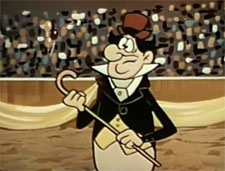 Regrettably, things begin to get non-productive, repetitious, and rather tedious for the next eight episodes or so. More sabotage occurs, as a trained seal is put into a sleeping spell by sedative-soaked sardines. A juggler has his Indian clubs interfered with by a pole shoved through a backdrop curtain, causing the clubs to fall and leave club-shaped lumps on the juggler’s head. A similar fate befalls a furniture-balancing act, when a wooden stool is pulled out from under a balanced grand piano atop the performer’s feet. Q.T. trudges along, meeting clowns, a snake charmer, a bareback rider, and a strong man – all who prove to be false leads. Twice more, Q.T, as a sitting duck, takes time out with Shamus to try a carnival ride, only to have the conveyance severed from the ride, leading to a flight through the air and a narrow aversion of a crash landing. (An airplane ride lands with its pointed nose penetrating the bulls-eye of a target in the dart-throwing booth.) A tunnel of love ride with the bareback rider leaves Q.T. open to an arrow-shot from a Cupid statue, which fortunately only pins him to the boat by his sleeve. Q.T. finally asks the Colonel who else besides him knows he’s on the case, and is informed that Rico the Ringmaster is the only one. Investigating Rico’s tent, Hush overhears Rico plotting to buy out the circus cheap after it is forced to close. (Oddly, he is relating this plan to the bareback rider, as if she is a confidant in crime – yet she later seems cleared of all complicity.) Q.T. sends Shamus to fetch the police chief, but himself is captured by a quick flip of a ringmaster’s whip around his ankles, and faces brief peril tied to the moving belt of a shooting gallery. At the evening performance, Rico is surrounded by Hush, Shamus, and the sheriff, all dressed as clowns. But a few quick snaps of the whip disarm the good guys, and Rico escapes. He tries to take the bareback rider along with him, and hides in another tent – but unwisely chooses the elephant tent, where one of the elephants seizes him in her trunk, long enough for Hush and the sheriff to make the capture. Once things have quieted down, Q.T. enjoys a romantic evening with the bareback rider. He inquires that he thought she had a crush on Rico. The rider responds that it was the elephant who had a crush on Rico – she has a crush on Hush.
Regrettably, things begin to get non-productive, repetitious, and rather tedious for the next eight episodes or so. More sabotage occurs, as a trained seal is put into a sleeping spell by sedative-soaked sardines. A juggler has his Indian clubs interfered with by a pole shoved through a backdrop curtain, causing the clubs to fall and leave club-shaped lumps on the juggler’s head. A similar fate befalls a furniture-balancing act, when a wooden stool is pulled out from under a balanced grand piano atop the performer’s feet. Q.T. trudges along, meeting clowns, a snake charmer, a bareback rider, and a strong man – all who prove to be false leads. Twice more, Q.T, as a sitting duck, takes time out with Shamus to try a carnival ride, only to have the conveyance severed from the ride, leading to a flight through the air and a narrow aversion of a crash landing. (An airplane ride lands with its pointed nose penetrating the bulls-eye of a target in the dart-throwing booth.) A tunnel of love ride with the bareback rider leaves Q.T. open to an arrow-shot from a Cupid statue, which fortunately only pins him to the boat by his sleeve. Q.T. finally asks the Colonel who else besides him knows he’s on the case, and is informed that Rico the Ringmaster is the only one. Investigating Rico’s tent, Hush overhears Rico plotting to buy out the circus cheap after it is forced to close. (Oddly, he is relating this plan to the bareback rider, as if she is a confidant in crime – yet she later seems cleared of all complicity.) Q.T. sends Shamus to fetch the police chief, but himself is captured by a quick flip of a ringmaster’s whip around his ankles, and faces brief peril tied to the moving belt of a shooting gallery. At the evening performance, Rico is surrounded by Hush, Shamus, and the sheriff, all dressed as clowns. But a few quick snaps of the whip disarm the good guys, and Rico escapes. He tries to take the bareback rider along with him, and hides in another tent – but unwisely chooses the elephant tent, where one of the elephants seizes him in her trunk, long enough for Hush and the sheriff to make the capture. Once things have quieted down, Q.T. enjoys a romantic evening with the bareback rider. He inquires that he thought she had a crush on Rico. The rider responds that it was the elephant who had a crush on Rico – she has a crush on Hush.
 Format Films’ The Alvin Show would feature an oldie in one of the show’s song segments, The Man on the Flying Trapeze (circa 1961). No copy of the segment has been located online, but the soundtrack appeared on the LP, “The Chipmunk Songbook”, for your enjoyment. The framework for the episode is Dave Seville unearthing an old player piano out of his attic, with one piano roll left, illustrated with pictures. Alvin wants to play it and sing, but the chipmunks aren’t tall enough to do both. Alvin temporarily talks Simon and Theodore into doing the pumping (and all the work) while he sings the opening verse and chorus from above. Simon and Theodore go on a labor strike because they can’t see the pictures, and Dave sits in to do pumping and singing to avoid the squabbles. Unfortunately, the audio gives no indication how the film paid off, not suggesting an ending. Knowing Alvin, the boys probably start swinging from something in the attic like trapeze artists, and wreak havoc.
Format Films’ The Alvin Show would feature an oldie in one of the show’s song segments, The Man on the Flying Trapeze (circa 1961). No copy of the segment has been located online, but the soundtrack appeared on the LP, “The Chipmunk Songbook”, for your enjoyment. The framework for the episode is Dave Seville unearthing an old player piano out of his attic, with one piano roll left, illustrated with pictures. Alvin wants to play it and sing, but the chipmunks aren’t tall enough to do both. Alvin temporarily talks Simon and Theodore into doing the pumping (and all the work) while he sings the opening verse and chorus from above. Simon and Theodore go on a labor strike because they can’t see the pictures, and Dave sits in to do pumping and singing to avoid the squabbles. Unfortunately, the audio gives no indication how the film paid off, not suggesting an ending. Knowing Alvin, the boys probably start swinging from something in the attic like trapeze artists, and wreak havoc.
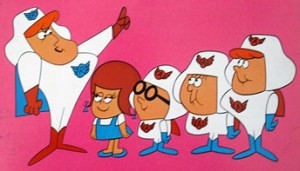 Daring Young Man (Roger Ramjet, 10/25/65) – Independent Pantomime Pictures, Inc./Snyder-Koren Productions produced this cheap yet sometimes clever series about jet jockey and all-around good guy Roger Ramjet, an aerial-ace sort of Dudley Do-Right (voiced by Gary Owens) who is often about as dense in the dome as the Mountie, and whose episodes show a decided inspiration from the offbeat style of Jay Ward. Roger’s gimmick was a not-so-secret proton energy pill, which, when swallowed, would provide him with the power of 20 atom bombs for 20 seconds. (He must get his pharmaceuticals from the same lab as Underdog.)
Daring Young Man (Roger Ramjet, 10/25/65) – Independent Pantomime Pictures, Inc./Snyder-Koren Productions produced this cheap yet sometimes clever series about jet jockey and all-around good guy Roger Ramjet, an aerial-ace sort of Dudley Do-Right (voiced by Gary Owens) who is often about as dense in the dome as the Mountie, and whose episodes show a decided inspiration from the offbeat style of Jay Ward. Roger’s gimmick was a not-so-secret proton energy pill, which, when swallowed, would provide him with the power of 20 atom bombs for 20 seconds. (He must get his pharmaceuticals from the same lab as Underdog.)
We open upon Roger, literally submerged in a pile of unpaid bills. A sample bill is from his friendly doctor – “Please remit overdue payment, or I’ll kill you.” A phone call comes in from Bob Bungling of the Bungling Brothers Circus. “You remember me”, Bob asks. “How could I ever forget you, Mr. Circus?”, says Roger, forgetting the name as soon as he’s heard it. “No, it’s Bungling, Roger”, respond Bob. “That’s funny. You’re the third person today that’s called me ‘Bungling Roger’.” Bob finally gets the conversation back on track, advising Roger that no one is coming to see his shows, and worse yet, strange accidents, disappearances, etc. are plaguing the circus. He adds that the bank is about to foreclose on him if he doesn’t rase some cash. Thinking Bob is looking for a deep pocket, Roger claims to be a little short himself, having just paid his SAG and AFTRA dues. Bob, however, isn’t after dough, but after Roger – who he wants to perform an act with the circus, guaranteed to draw the crowds in. Roger is still mumbling that circuses are a little out of his line, when Bob ends the conversation with. “Good, it’s settled. See you tonight.”
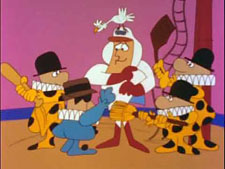 As predicted, crowds pack the arena. But ths makes someone unhappy – the man behind the circus’s accidents – villainous Noodles Romanoff. He and hs gang of No Goods plan to stage one more nasty accident, so the show will close and Noodles can buy up the circus cheap. (Noodles’ bird-brained thugs repeat the remark as “Cheep, cheep, cheep”.) Plus, with Ramjet in the show, they can kill two birds with one stone, by getting rid of “rotten Ramjet”. Happy with the whole idea, Romanoff sums up the plot in no-goodnik fashion: “Boys, we never had it so bad!” The villains disguise as clowns, and mingle with the performers. Inside the tent, Bob announces Roger’s act (scheduled without the luxury of rehearsal). Roger will swing from a trapeze (without the aid of a net), perform a triple somersault while leaping through a suspended hoop of flame, catch a second trapeze on the other side of the hoop, and swing to a second platform across the arena – all while balancing a live chicken atop his head. Roger would be worried if he didn’t have a trusty box of proton pills stashed away in his pocket. Or does he? – as the clowns surround him with playful club bashing, and the nimble fingers of Romanoff snatch the pill box from Roger’s trousers. Roger climbs a ladder to the trapeze platform, then reaches for his pills, to find them gone. Roger turns as chicken as the bird on his head, convinced he can’t do the act without them – as the trapeze bar swings under Roger’s rear, carrying him off the platform. While screaming, Roger is flipped by the bar into the triple somersault, makes his way through the hoop as if trying to perform a swimming breast stroke through the air, then scrambles as if trying to walk on air to the second platform, without ever laying hands on the second trapeze. As he hangs safely by his hands and chin on the second platform, the reaction of the chicken is seen, as she lays an egg which cracks over Roger’s face. Roger’s not out of danger yet, as Bob announces the next stage of his act – a 300 foot high dive. With a little more confidence at having survived the first stunt, Roger takes the leap – only to notice that those playful clowns have moved the water tank. “Some guys will fo anything for a LAUG-G-G-G-G-H…”, shouts Roger, in the way down. BAM! POW! HURT! When the dust clears, Roger has somehow landed directly upon Romanoff and his No-Goods, saving the show and bringing the crooks to justice. The film ends with Roger settling down to bed, hanging on the wall as a momento a circus poster advertising his act, which the narrator repeats word for word, almost: “Heroic, death-defying, sparkling, super-colossal, stupendous circus act!” “You left out ‘wonderful’”, complains Roger, as the narrator corrects himself, for the fade out.
As predicted, crowds pack the arena. But ths makes someone unhappy – the man behind the circus’s accidents – villainous Noodles Romanoff. He and hs gang of No Goods plan to stage one more nasty accident, so the show will close and Noodles can buy up the circus cheap. (Noodles’ bird-brained thugs repeat the remark as “Cheep, cheep, cheep”.) Plus, with Ramjet in the show, they can kill two birds with one stone, by getting rid of “rotten Ramjet”. Happy with the whole idea, Romanoff sums up the plot in no-goodnik fashion: “Boys, we never had it so bad!” The villains disguise as clowns, and mingle with the performers. Inside the tent, Bob announces Roger’s act (scheduled without the luxury of rehearsal). Roger will swing from a trapeze (without the aid of a net), perform a triple somersault while leaping through a suspended hoop of flame, catch a second trapeze on the other side of the hoop, and swing to a second platform across the arena – all while balancing a live chicken atop his head. Roger would be worried if he didn’t have a trusty box of proton pills stashed away in his pocket. Or does he? – as the clowns surround him with playful club bashing, and the nimble fingers of Romanoff snatch the pill box from Roger’s trousers. Roger climbs a ladder to the trapeze platform, then reaches for his pills, to find them gone. Roger turns as chicken as the bird on his head, convinced he can’t do the act without them – as the trapeze bar swings under Roger’s rear, carrying him off the platform. While screaming, Roger is flipped by the bar into the triple somersault, makes his way through the hoop as if trying to perform a swimming breast stroke through the air, then scrambles as if trying to walk on air to the second platform, without ever laying hands on the second trapeze. As he hangs safely by his hands and chin on the second platform, the reaction of the chicken is seen, as she lays an egg which cracks over Roger’s face. Roger’s not out of danger yet, as Bob announces the next stage of his act – a 300 foot high dive. With a little more confidence at having survived the first stunt, Roger takes the leap – only to notice that those playful clowns have moved the water tank. “Some guys will fo anything for a LAUG-G-G-G-G-H…”, shouts Roger, in the way down. BAM! POW! HURT! When the dust clears, Roger has somehow landed directly upon Romanoff and his No-Goods, saving the show and bringing the crooks to justice. The film ends with Roger settling down to bed, hanging on the wall as a momento a circus poster advertising his act, which the narrator repeats word for word, almost: “Heroic, death-defying, sparkling, super-colossal, stupendous circus act!” “You left out ‘wonderful’”, complains Roger, as the narrator corrects himself, for the fade out.
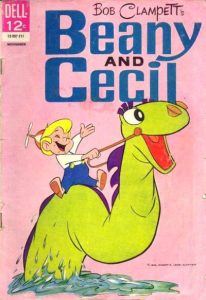 Cleverly lampooning the title of the academy-award winning circus feature mentioned earlier in these articles, Bob Clampett Productions gives us Cecil B. De Sea Serpent’s The Greatest Shmoe On Earth (2/24/62) – This episode was unusual in presentation for the Beany and Cecil series, supplying effects for the sounds of a crowd in the circus arena by employing a standard television laugh track. Actually, it took me many viewings to realize that the track’s use was intended to represent the circus audience, and the film played more as if it had been produced as a pilot for the series (which it was not), styled in presentation like a Hanna-Barbera sitcom such as The Flintstones, The Jetsons, etc.
Cleverly lampooning the title of the academy-award winning circus feature mentioned earlier in these articles, Bob Clampett Productions gives us Cecil B. De Sea Serpent’s The Greatest Shmoe On Earth (2/24/62) – This episode was unusual in presentation for the Beany and Cecil series, supplying effects for the sounds of a crowd in the circus arena by employing a standard television laugh track. Actually, it took me many viewings to realize that the track’s use was intended to represent the circus audience, and the film played more as if it had been produced as a pilot for the series (which it was not), styled in presentation like a Hanna-Barbera sitcom such as The Flintstones, The Jetsons, etc.
Beany, Captain Huffenpuff, and of course Cecil, have made their latest capture of an exotic beast – a weird creature who seems to be more box than beast called the Shmoe. All we see of its inner form within the box are a protruding pair of beady eyes on extensions rather than in sockets and two extra-long hairy limbs of different colors which emerge at intervals from under the box lid, plus a pair of feet protruding out the bottom of the box. Cecil carries the box, its lid tied shut with rope, atop his head, as the boys arrive at the circus, to cash in on a reward for its capture. For once, Captain Huffenpuff seems less interested in the reward than the others – his natural cowardice providing a stronger impulse to “see the last of this ding-dang monster.” Beany also looks forward to “seeing their old pal Clowny again.” (Clowny was a perhaps less-than-memorable supporting character on the original puppet show, an appearance by whom can be seen on the Youtube website of “Not An Animation Historian”, for whom this would mark his only animated appearance.) Clowny greets the boys to the big top, and introduces them to his boss, Colonel John Ringading North By Northwest Barker III (a little man half the size of his name). Clowny first refers to Uncle Captain as “Captain Fatty”, then introduces him to the Colonel by the formal name of “Captain Whiffenpoof”. Huffenpuff tries to correct this name error, but the Colonel addresses him as “Huffenwhiff”, then adds, “Why should I be the only one to get it right?” When Cecil is introduced, the Colonel extends his hand for a handshake. Cecil is confused, as, despite his own entire lack of arms, a long hand reaches out to shake the Colonel’s. The Shmoe has broken the rope, and flipped the lid on his box. The hand tickles the Colonel under the chin, causing him to suggestively remark, “Later, Baby. Wait for me in the truck.” The Colonel attempts to hand Cecil an armload of cash for the Shmoe’s capture, but the money is seized by the strange long hands, which also grab the Colonel’s hat. Cecil turns to see the Shmoe stuff the money inside his box, then beat it into the arena, wearing the Colonel’s hat atop the box. “Hey, Mr. Shmoe. Come back with our dough!”, yells Cecil. The chase leads under the legs of an elephant, then up a ladder to a high diving platform. “Drop that loot, you galoot”, continues to rant Cecil, as the beast dives into a tank below. Cecil also takes the leap, but by this time, the monster has pushed away the tank, and replaced it with an old jelly jar, containing a single drop of water from an eye dropper. Cecil winds up with his face stuffed in the glass, and the rest of him piled up like a pleated ribbon atop it. “That was quite a jar”, says the muffled voice of the serpent, as the hand of the Shmoe reaches into the frame to smash the glass with a hammer.
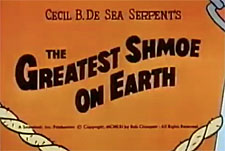 Meanwhile, Captain Huffenpuff has suggested splitting up, allegedly so that he and Cecil can “surround” the beast. Instead, he really intends to “tippy-toe” to his own “hiding box”. The beast appears before him, with a beckoning finger. Captain reverses direction, but the monster outraces him, doubling back to a position ahead of the Captain’s path. Producing an artists’s palette and wearing a French beret over his eyeballs, the Shmoe paints on the side of his box the words “Uncle Captain’s Hiding Box.” Huffenpuff arrives, and irrespective of whether there is any resemblance between the Shmoe’s box and his own, takes the cue of the sign, and leaps in. There is a struggle within the box. The lid flips open, and Huffenpuff slowly rises halfway, with a facial expression that looks like he is going to be violently sick. A hand of the Shmoe reaches out to a point above him, and gently pushes the Captain back in the box with one finger. More struggle, and the Captain finally bursts out in a panicked blur. The beast next tries to get Clowny to enter. The terrorized clown does an Avery-style take, zooms to catch up with the Captain, and hops onto the Captain’s head. “Off the head, Clowny”, yells Huffenpuff, as Clowny gets knocked away by catching his chin on a low-strung trapeze bar. The Captain finally reaches a place where he pauses to catch his breath. “Safe at last”, he says, wiping his brow – oblivious to the fact he has just entered a gorilla cage, with the huge ape snarling right behind him.
Meanwhile, Captain Huffenpuff has suggested splitting up, allegedly so that he and Cecil can “surround” the beast. Instead, he really intends to “tippy-toe” to his own “hiding box”. The beast appears before him, with a beckoning finger. Captain reverses direction, but the monster outraces him, doubling back to a position ahead of the Captain’s path. Producing an artists’s palette and wearing a French beret over his eyeballs, the Shmoe paints on the side of his box the words “Uncle Captain’s Hiding Box.” Huffenpuff arrives, and irrespective of whether there is any resemblance between the Shmoe’s box and his own, takes the cue of the sign, and leaps in. There is a struggle within the box. The lid flips open, and Huffenpuff slowly rises halfway, with a facial expression that looks like he is going to be violently sick. A hand of the Shmoe reaches out to a point above him, and gently pushes the Captain back in the box with one finger. More struggle, and the Captain finally bursts out in a panicked blur. The beast next tries to get Clowny to enter. The terrorized clown does an Avery-style take, zooms to catch up with the Captain, and hops onto the Captain’s head. “Off the head, Clowny”, yells Huffenpuff, as Clowny gets knocked away by catching his chin on a low-strung trapeze bar. The Captain finally reaches a place where he pauses to catch his breath. “Safe at last”, he says, wiping his brow – oblivious to the fact he has just entered a gorilla cage, with the huge ape snarling right behind him.
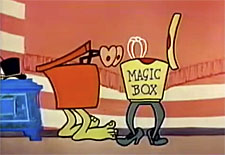 We leave the Captain to return to Cecil. “Come back here, you second-rate crate”, the serpent demands. The beast continues forward, then pauses under its lid, placing outside the box a three-stage sign-pole. Cecil stops to read it. In the manner of a then-popular sales jingle of Gillette razors, the serpent states aloud, “To look sharp – feel sharp – be sharp…”, then reads the last words from around a hole that the Shmoe has cut in one side of his box: “…insert face here.” Cecil does, and we hear the grinding sounds as if Cecil were inside the workings of an automatic pencil sharpener. The serpent emerges, with his head shaped like a sharpened pencil. “I may look sharp, but I don’t feel sharp”, he mumbles. The beast escapes the main tent, and ducks into a smaller one with sign reading “Magic Show”. Cecil looks inside, finding a portion of the tent set up as a dressing room, but no visible sign of the Shmoe. However, he observes another cubic object in the center of the room, of a different color than the Shmoe, and mounted of a set of curving legs, labeled “Magic Box”. Cecil decides to borrow this, then takes from a dressing table a stick of lipstick, drawing along the box’s lid a pair of bright red female lips. He gives out a whistle for the Shmoe, then stands back to watch the fun. The Shmoe, some distance ahead, turns to look – and is instantly smitten. He returns to the box Cecil has doctored, gazing with wide-eyed admiration as its lid opens. Several leaves appear out of it, followed by the white outline of a flower and stem. The outline morphs into a heart, then a figure of Dan Cupid, which shoots an arrow at the heart of the Shmoe. The beast swoons, into an embrace with Cecil’s box, as the scene faces out for a time transition. We fade in with Cecil, Beany, and Huffenpuff in the grandstand for the evening performance, as the Colonel calls out, “Ladies, gentlemen, and riff raff”, and introduces the Shmoe – and family! Gestation period for Shmoes must be amazingly fast, as now, the domesticated Shmoe appears, followed by Cecil’s box, which has also somehow come to life, and three smaller boxed Shmoes, already of varying sizes and ages. “There’s no business like Shmoe business”, observes Cecil as the family passes them. However, junior Shmoes learn quickly, as baby Shmoe grabs away the pile of the boys’ cash as he passes, leaving the boys empty-handed again for the iris out.
We leave the Captain to return to Cecil. “Come back here, you second-rate crate”, the serpent demands. The beast continues forward, then pauses under its lid, placing outside the box a three-stage sign-pole. Cecil stops to read it. In the manner of a then-popular sales jingle of Gillette razors, the serpent states aloud, “To look sharp – feel sharp – be sharp…”, then reads the last words from around a hole that the Shmoe has cut in one side of his box: “…insert face here.” Cecil does, and we hear the grinding sounds as if Cecil were inside the workings of an automatic pencil sharpener. The serpent emerges, with his head shaped like a sharpened pencil. “I may look sharp, but I don’t feel sharp”, he mumbles. The beast escapes the main tent, and ducks into a smaller one with sign reading “Magic Show”. Cecil looks inside, finding a portion of the tent set up as a dressing room, but no visible sign of the Shmoe. However, he observes another cubic object in the center of the room, of a different color than the Shmoe, and mounted of a set of curving legs, labeled “Magic Box”. Cecil decides to borrow this, then takes from a dressing table a stick of lipstick, drawing along the box’s lid a pair of bright red female lips. He gives out a whistle for the Shmoe, then stands back to watch the fun. The Shmoe, some distance ahead, turns to look – and is instantly smitten. He returns to the box Cecil has doctored, gazing with wide-eyed admiration as its lid opens. Several leaves appear out of it, followed by the white outline of a flower and stem. The outline morphs into a heart, then a figure of Dan Cupid, which shoots an arrow at the heart of the Shmoe. The beast swoons, into an embrace with Cecil’s box, as the scene faces out for a time transition. We fade in with Cecil, Beany, and Huffenpuff in the grandstand for the evening performance, as the Colonel calls out, “Ladies, gentlemen, and riff raff”, and introduces the Shmoe – and family! Gestation period for Shmoes must be amazingly fast, as now, the domesticated Shmoe appears, followed by Cecil’s box, which has also somehow come to life, and three smaller boxed Shmoes, already of varying sizes and ages. “There’s no business like Shmoe business”, observes Cecil as the family passes them. However, junior Shmoes learn quickly, as baby Shmoe grabs away the pile of the boys’ cash as he passes, leaving the boys empty-handed again for the iris out.
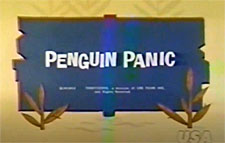 Many episodes of Terrytoons’ Deputy Dawg fell into a sort of formula, which could be called, “lawbreaker of the week”. Introduce a new character to cause havoc or pilfer goodies from the Deputy’s territory, have Muskie and Vincent Van Gopher offer the Deputy “assistance” in apprehending the criminal, and let the boys bumble their way through five to six minutes until the criminal is apprehended. Thanks to clever dialogue and gag-writing, the formula worked, and usually didn’t feel stale. This also gave the opportunity for Deputy Dawg to interface with three circus refugees, much in the same manner as so many characters had at Hanna-Barbera.
Many episodes of Terrytoons’ Deputy Dawg fell into a sort of formula, which could be called, “lawbreaker of the week”. Introduce a new character to cause havoc or pilfer goodies from the Deputy’s territory, have Muskie and Vincent Van Gopher offer the Deputy “assistance” in apprehending the criminal, and let the boys bumble their way through five to six minutes until the criminal is apprehended. Thanks to clever dialogue and gag-writing, the formula worked, and usually didn’t feel stale. This also gave the opportunity for Deputy Dawg to interface with three circus refugees, much in the same manner as so many characters had at Hanna-Barbera.
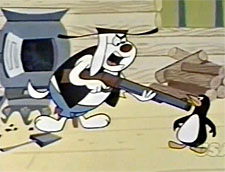 In Penguin Panic (5/15/60 – Mannie Davis, dir.), the South experiences a surprising chill, dropping down to a record 45 degrees. For Muskie and Vincent, this is enough to make them jump around with the shivers. “This Yankee weather’s gonna freeze us half to death if we don’t get a fire built”, observes Muskie. The obvious source for wood is Deputy Dawg’s jailhouse, where the Deputy sits comfortably under a blanket, close to the heat from the fire in a pot-bellied stove. Muskie cautiously reaches an arm through one of the windows of the jailhouse, slipping one log at a time out from the Deputy’s wood pile. On his third reach, a much thinner cylinder is lifted through the window – the barrel of Deputy’s shotgun. “Put ‘em back, Muskie”, shouts Deputy. Though Muskie appeals to Deputy that he wouldn’t want to see Muskie freeze, Deputy insists he needs the wood to keep from freezing himself. Back at Muskie’s house, Vincent still paces the ground and slaps his arms against his sides to keep warm, bit is scared silly when he spots a stranger, who has a very different reaction to the weather. Trotting along comes, of all things, a penguin – perspiring profusely, and waving a small hand fan at himself in a futile attempt to keep cool. Vincent, unable to see clearly, hides inside the house, and when Muskie returns, insists he’s seen a moon monster. Muskie drags Vincent outside to investigate the sighting and prove Vincent wrong, and catches up with the penguin at the jailhouse, where the bird, passing the window of Deputy, has become irate with the heat emitted from the stove, and throws a bucket of water upon the Deputy’s fire. Muskie identifies the bird to all as a penguin, referring to him as a “real Southerner”. The bird, still in search of relief from the heat, suddenly disappears, and is heard inside Deputy Dawg’s ice box, where he is discovered devouring Deputy’s frozen vegetables, and resetting the thermostat to its coldest setting.
In Penguin Panic (5/15/60 – Mannie Davis, dir.), the South experiences a surprising chill, dropping down to a record 45 degrees. For Muskie and Vincent, this is enough to make them jump around with the shivers. “This Yankee weather’s gonna freeze us half to death if we don’t get a fire built”, observes Muskie. The obvious source for wood is Deputy Dawg’s jailhouse, where the Deputy sits comfortably under a blanket, close to the heat from the fire in a pot-bellied stove. Muskie cautiously reaches an arm through one of the windows of the jailhouse, slipping one log at a time out from the Deputy’s wood pile. On his third reach, a much thinner cylinder is lifted through the window – the barrel of Deputy’s shotgun. “Put ‘em back, Muskie”, shouts Deputy. Though Muskie appeals to Deputy that he wouldn’t want to see Muskie freeze, Deputy insists he needs the wood to keep from freezing himself. Back at Muskie’s house, Vincent still paces the ground and slaps his arms against his sides to keep warm, bit is scared silly when he spots a stranger, who has a very different reaction to the weather. Trotting along comes, of all things, a penguin – perspiring profusely, and waving a small hand fan at himself in a futile attempt to keep cool. Vincent, unable to see clearly, hides inside the house, and when Muskie returns, insists he’s seen a moon monster. Muskie drags Vincent outside to investigate the sighting and prove Vincent wrong, and catches up with the penguin at the jailhouse, where the bird, passing the window of Deputy, has become irate with the heat emitted from the stove, and throws a bucket of water upon the Deputy’s fire. Muskie identifies the bird to all as a penguin, referring to him as a “real Southerner”. The bird, still in search of relief from the heat, suddenly disappears, and is heard inside Deputy Dawg’s ice box, where he is discovered devouring Deputy’s frozen vegetables, and resetting the thermostat to its coldest setting.
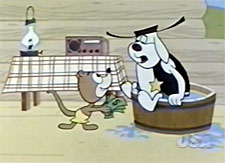 Deputy tries to pry the bird loose from the ice box, but ends up knocked inside the device himself. Muskie can’t get the door open to release him, and the only way Vincent can think of to solve the problem is to blast the door open with dynamite. The ice box is shattered, revealing Deputy inside, frozen into a solid block of ice. Muskie pushes and lifts the ice block over to atop the pot-bellied stove, while the penguin, happy to see something cold again, hops atop the ice block and begins skating figure-8’s atop poor Deputy. Muskie strikes a match to restart a fire in the oven below, but the angry penguin bends down, repeatedly blowing out each match the muskrat lights. Vincent warns that something needs to be done fast, as Deputy Dawg is now turning a deep blue. Muskie cooks up a plan to distract the penguin, and whispers it into Vincent’s ear. The next minute, Muskie is looking out the window, and shivering at the sight of what appears to be a snowstorm outside. In reality, it is Vincent on the roof, shaking a salt shaker down in front of the window, and jingling a string of sleigh bells for audio effect. The penguin leaps out the window, giving Muskie time to light the fire, then run outside to assist Vincent in trying to capture the penguin. Deputy is left with the fire roasting under him, and suddenly leaps out of the ice block like a rocket and through the roof, landing outside hard upon his roasting tail bone. Deputy ultimately winds up cooling off his sizzling tail in a bucket of water, while a radio broadcast announces that the penguin has been returned to the circus after a three-day absence. Muskie appears with a fistful of cash – a reward he received for returning the penguin. Easy come, east go, as Deputy confiscates the cash, to replace the ice box, compensate for his injured tail bone, and impose a fine “for upsetting my dignity”.
Deputy tries to pry the bird loose from the ice box, but ends up knocked inside the device himself. Muskie can’t get the door open to release him, and the only way Vincent can think of to solve the problem is to blast the door open with dynamite. The ice box is shattered, revealing Deputy inside, frozen into a solid block of ice. Muskie pushes and lifts the ice block over to atop the pot-bellied stove, while the penguin, happy to see something cold again, hops atop the ice block and begins skating figure-8’s atop poor Deputy. Muskie strikes a match to restart a fire in the oven below, but the angry penguin bends down, repeatedly blowing out each match the muskrat lights. Vincent warns that something needs to be done fast, as Deputy Dawg is now turning a deep blue. Muskie cooks up a plan to distract the penguin, and whispers it into Vincent’s ear. The next minute, Muskie is looking out the window, and shivering at the sight of what appears to be a snowstorm outside. In reality, it is Vincent on the roof, shaking a salt shaker down in front of the window, and jingling a string of sleigh bells for audio effect. The penguin leaps out the window, giving Muskie time to light the fire, then run outside to assist Vincent in trying to capture the penguin. Deputy is left with the fire roasting under him, and suddenly leaps out of the ice block like a rocket and through the roof, landing outside hard upon his roasting tail bone. Deputy ultimately winds up cooling off his sizzling tail in a bucket of water, while a radio broadcast announces that the penguin has been returned to the circus after a three-day absence. Muskie appears with a fistful of cash – a reward he received for returning the penguin. Easy come, east go, as Deputy confiscates the cash, to replace the ice box, compensate for his injured tail bone, and impose a fine “for upsetting my dignity”.
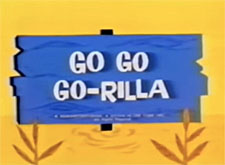 Go-Go Go-rilla (1963 – Dave Tendlar, dir.) – Deputy is fishing at the creek, and well-prepared. His line is tied around his ankle, and he snoozes away the afternoon, fastened to a tree by a seat belt around the waist so that the whoppers don’t pull him into the water. Just as he hooks a big one, Muskie and Vincent disturb his bliss with a report that he’ll be fighting something bigger than the fish. Big Bad has escaped from the circus – a gorilla who Deputy describes as 7 feet tall, “with those big muscles on his other muscles”. At hearing of the escape, Deputy resolves that he’s got to go protect somebody – namely, “me”. He starts to run, but is slammed back into the tree by his “unsafe safety belt”. Deputy speeds for the safety of the jail, with Muskie and Vincent right behind. But Deputy finds a surprise inside, as a huge brown furry arm bounces him out of the jailhouse like a basketball. Big Bad is already inside. As protector of the town, there is only one thing Deputy can do – “Run and hide somewhere”. Muskie hangs onto Deputy’s tail, stating that if Deputy runs out, Muskie and Vince will lose all respect for him. Still a coward at heart, Deputy resignedly states, “Well, toodle-oo, respect.” Muskie pushes Deputy back to the jail, adding, “We’ll back you up till the end, there, boy”. The gorilla, however, is standing right in the jail doorway, and Deputy is pushed right into the beast’s chest. “And this is the end”, states Muskie, zipping out of frame. The gorilla drags Deputy into the jail, and after a scuffle, Deputy is tossed out, manacled hand and foot with his own handcuffs.
Go-Go Go-rilla (1963 – Dave Tendlar, dir.) – Deputy is fishing at the creek, and well-prepared. His line is tied around his ankle, and he snoozes away the afternoon, fastened to a tree by a seat belt around the waist so that the whoppers don’t pull him into the water. Just as he hooks a big one, Muskie and Vincent disturb his bliss with a report that he’ll be fighting something bigger than the fish. Big Bad has escaped from the circus – a gorilla who Deputy describes as 7 feet tall, “with those big muscles on his other muscles”. At hearing of the escape, Deputy resolves that he’s got to go protect somebody – namely, “me”. He starts to run, but is slammed back into the tree by his “unsafe safety belt”. Deputy speeds for the safety of the jail, with Muskie and Vincent right behind. But Deputy finds a surprise inside, as a huge brown furry arm bounces him out of the jailhouse like a basketball. Big Bad is already inside. As protector of the town, there is only one thing Deputy can do – “Run and hide somewhere”. Muskie hangs onto Deputy’s tail, stating that if Deputy runs out, Muskie and Vince will lose all respect for him. Still a coward at heart, Deputy resignedly states, “Well, toodle-oo, respect.” Muskie pushes Deputy back to the jail, adding, “We’ll back you up till the end, there, boy”. The gorilla, however, is standing right in the jail doorway, and Deputy is pushed right into the beast’s chest. “And this is the end”, states Muskie, zipping out of frame. The gorilla drags Deputy into the jail, and after a scuffle, Deputy is tossed out, manacled hand and foot with his own handcuffs.
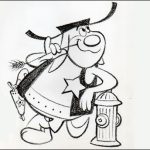 Deputy next approaches the jail with a long rope and lasso, and tosses the loop inside, snagging the ape. But instead of hauling the beast out, the ape hauls Deputy in. Moments later, Deputy is wound up in the rope, and the ape is playing yo-yo with him, then flips the bound Deputy headfirst into a tree. “Did that hurt you, DD?” asks Muskie. Weakly, Deputy replies, “Oh, no. It’s refreshing to break a tree with your head. Gives a fella somethin’ to do.” A new plan has Deputy and Muskie fasten a loop of chain to the rear bumper of the Sheriff’s car, with Muskie holding the loop end on the roof above the jailhouse door. Deputy calls from outside, challenging the gorilla to come out and fight. As the gorilla emerges, Muskie drops the chain loop around the gorilla. Deputy hops into the car and steps on the gas. But the powerful gorilla is unmovable, and the chain merely snaps, causing the car to crash into another tree. Deputy swears that he “wouldn’t tackle that ape again for a thousand dollars. That’s my price.” Muskie shows Deputy a reward poster, offering a hundred dollars. With a weakness for money, Deputy changes his tune: “That’s my price, too.” A new idea hatches, as the boys obtain a stalk of bananas, and Muskie and Vincent carry the stalk to the rear window of the interior jail cell. They lure the ape to the back of the jailhouse and the cell by slipping the stalk through the window bars. The ape takes the bait, entering the cell, and Deputy zips in the front jailhouse door, locking the cell door with his keys. How to get the ape to the circus? Deputy has the answer. Producing a saw, he saws through the walls and roof of the jailhouse, severing the rear cell from the rest of the structure. Then, with the battered but still operable Sheriff’s car, he tows the jail cell to the circus grounds, collecting his hundred dollars. Not a bad day’s pay for a deputy, he remarks, as he tows the jail cell back into place at the jail site. The sheriff, however, has arrived, and seeing the damage, confiscates the reward in the same manner as Deputy did in the last episode from Muskie, to cover repairs. However, the Sheriff admits that Deputy still has something coming. He turns Deputy around, and tells him to close his eyes for a surprise – then delivers him a powerful kick, sending Deputy sailing into the sky. “That Sheriff is all heart”, says Deputy, still soaring in the air for the fade out.
Deputy next approaches the jail with a long rope and lasso, and tosses the loop inside, snagging the ape. But instead of hauling the beast out, the ape hauls Deputy in. Moments later, Deputy is wound up in the rope, and the ape is playing yo-yo with him, then flips the bound Deputy headfirst into a tree. “Did that hurt you, DD?” asks Muskie. Weakly, Deputy replies, “Oh, no. It’s refreshing to break a tree with your head. Gives a fella somethin’ to do.” A new plan has Deputy and Muskie fasten a loop of chain to the rear bumper of the Sheriff’s car, with Muskie holding the loop end on the roof above the jailhouse door. Deputy calls from outside, challenging the gorilla to come out and fight. As the gorilla emerges, Muskie drops the chain loop around the gorilla. Deputy hops into the car and steps on the gas. But the powerful gorilla is unmovable, and the chain merely snaps, causing the car to crash into another tree. Deputy swears that he “wouldn’t tackle that ape again for a thousand dollars. That’s my price.” Muskie shows Deputy a reward poster, offering a hundred dollars. With a weakness for money, Deputy changes his tune: “That’s my price, too.” A new idea hatches, as the boys obtain a stalk of bananas, and Muskie and Vincent carry the stalk to the rear window of the interior jail cell. They lure the ape to the back of the jailhouse and the cell by slipping the stalk through the window bars. The ape takes the bait, entering the cell, and Deputy zips in the front jailhouse door, locking the cell door with his keys. How to get the ape to the circus? Deputy has the answer. Producing a saw, he saws through the walls and roof of the jailhouse, severing the rear cell from the rest of the structure. Then, with the battered but still operable Sheriff’s car, he tows the jail cell to the circus grounds, collecting his hundred dollars. Not a bad day’s pay for a deputy, he remarks, as he tows the jail cell back into place at the jail site. The sheriff, however, has arrived, and seeing the damage, confiscates the reward in the same manner as Deputy did in the last episode from Muskie, to cover repairs. However, the Sheriff admits that Deputy still has something coming. He turns Deputy around, and tells him to close his eyes for a surprise – then delivers him a powerful kick, sending Deputy sailing into the sky. “That Sheriff is all heart”, says Deputy, still soaring in the air for the fade out.
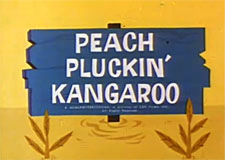 Peach Pluckin’ Kangaroo (5/16/63 – Bob Kuwahara, dir,) – Deputy’s peach orchard is being raided by a tall culprit who easily obtains the peaches by merely hopping up to them, stuffing them in a bushel basket. He is a genuine Australian kangaroo. Deputy takes a leap at the stranger, but mistimes his leap between the kangaroo’s jumps. He ends up on his belly, with the kangaroo landing on his back. Deputy shouts an inquiry: “What are you? – A pogo stick with pockets?” The kangaroo corrects Depity as to his species, and announces he is from Australia. Muskie remarks that he thinks that’s down south of Chattanooga, and Vincent adds, “It is, it is – isn’t it?” Deputy warns the stranger not to pilfer more peaches, or be “bounced” right into jail. “Now just a minute, copper. This is bush country, ain’t it?”, complains the kangaroo. Deputy has to admit there is a bush here and there. The kangaroo insists that his kind live off the bush country, and exits with a basket of peaches, whomping the Deputy on the head with “50 pounds of tail”.
Peach Pluckin’ Kangaroo (5/16/63 – Bob Kuwahara, dir,) – Deputy’s peach orchard is being raided by a tall culprit who easily obtains the peaches by merely hopping up to them, stuffing them in a bushel basket. He is a genuine Australian kangaroo. Deputy takes a leap at the stranger, but mistimes his leap between the kangaroo’s jumps. He ends up on his belly, with the kangaroo landing on his back. Deputy shouts an inquiry: “What are you? – A pogo stick with pockets?” The kangaroo corrects Depity as to his species, and announces he is from Australia. Muskie remarks that he thinks that’s down south of Chattanooga, and Vincent adds, “It is, it is – isn’t it?” Deputy warns the stranger not to pilfer more peaches, or be “bounced” right into jail. “Now just a minute, copper. This is bush country, ain’t it?”, complains the kangaroo. Deputy has to admit there is a bush here and there. The kangaroo insists that his kind live off the bush country, and exits with a basket of peaches, whomping the Deputy on the head with “50 pounds of tail”.
Deputy realizes that with a hopping culprit, he’ll have to fight fire with fire. Having Muskie and Vincent position his own bed outside the jailhouse, Deputy leaps from the jail roof onto it, and is propelled into the air, attempting to descend upon the kangaroo. The kangaroo merely ducks as he passes, and Deputy winds up face-first in the creek mud. Deputy realizes “Bouncing up is easy. It’s the coming down I’ve gotta figure out.” The “Down-under boy” is soon down-under Deputy’s peach trees again, as the lawman ties a pair of bedsprings to his feet. Another leap from the jailhouse roof, and Deputy is on the move. The kangaroo stops short, and Deputy bounces right past him, receiving the applause of the kangaroo at a “good show”. Deputy crash-lands into the henhouse, wrecking it, but still waving a finger at the kangaroo from beneath the rubble, “Let that be a lesson to you!”
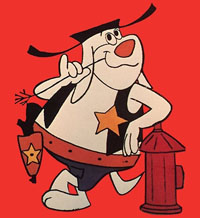 Finally, Deputy and the boys haul a large sheet of tin to the jail roof, and fold it into the shape of a giant paper airplane. Deputy seats himself on it, while Muskie and Vincent toss him off the roof. The arrest is again delayed, as the kangaroo ducks again, leaving Deputy to be caught in a strong updraft. Deputy passes a commercial arliner, and helplessly tries to remember how he used to control paper airplanes. He decides to try scrunching his weight forward just a bit – and sends the tin plane into an unexpected nose-dive. Finally, he intercepts the kangaroo, the nose of the plane catching the marsupial in the back, and driving them both into the jailhouse. Deputy is thrown headfirst into one of the jail cell bars, bending it into his silhouette. But the kangaroo lands inside the cell. “Thirty dollars or thirty days”, shouts Deputy. The kangaroo pleads his case, informing Deputy that he was only trying to tide his family over until he could pick up a few “bob” in the circus over here. Outside the cell, his “missus” appears, together with a “little shaver” in her pouch. “Well, in that case, maybe I can let you work to pay off the fine”, says Deputy. We fade to the sheriff arriving to inspect how Deputy is doing lately. Muskie and Vincent are the only ones at the jailhouse, and inform the sheriff that Deputy is out on traffic duty, doing record business in giving out speeding tickets. Deputy arrives, riding inside the kangaroo’s pouch, and hands the Sheriff a handful of the latest citations he has given out. “This kangaroo with the bucket seat can catch anything”, laughs Deputy, for the fade out.
Finally, Deputy and the boys haul a large sheet of tin to the jail roof, and fold it into the shape of a giant paper airplane. Deputy seats himself on it, while Muskie and Vincent toss him off the roof. The arrest is again delayed, as the kangaroo ducks again, leaving Deputy to be caught in a strong updraft. Deputy passes a commercial arliner, and helplessly tries to remember how he used to control paper airplanes. He decides to try scrunching his weight forward just a bit – and sends the tin plane into an unexpected nose-dive. Finally, he intercepts the kangaroo, the nose of the plane catching the marsupial in the back, and driving them both into the jailhouse. Deputy is thrown headfirst into one of the jail cell bars, bending it into his silhouette. But the kangaroo lands inside the cell. “Thirty dollars or thirty days”, shouts Deputy. The kangaroo pleads his case, informing Deputy that he was only trying to tide his family over until he could pick up a few “bob” in the circus over here. Outside the cell, his “missus” appears, together with a “little shaver” in her pouch. “Well, in that case, maybe I can let you work to pay off the fine”, says Deputy. We fade to the sheriff arriving to inspect how Deputy is doing lately. Muskie and Vincent are the only ones at the jailhouse, and inform the sheriff that Deputy is out on traffic duty, doing record business in giving out speeding tickets. Deputy arrives, riding inside the kangaroo’s pouch, and hands the Sheriff a handful of the latest citations he has given out. “This kangaroo with the bucket seat can catch anything”, laughs Deputy, for the fade out.
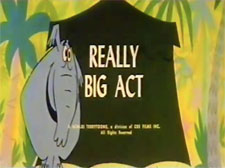 Really Big Act (Silly Sidney, 1961 – Connie Rasinski, dir.) – An initial note: Data is sketchy during this period as to what Terrytoons received theatrical releases and which went to home screens. Though I’ve never found this one on a list of theatricals, a print has turned up in widescreen format, suggesting it may be an overlooked title issued in theaters, though it certainly made TV as well. Today’s adventure finds Sidney a-flutter with excitement, as he shows a poster he’s found in the jungle to Cleo the giraffe and Stanley the lion (while standing on Stanley’s foot). The Dingbat and Daly circus is sending talent scouts into the jungle, looking for new animal acts. While Sidney dreams of fame and fortune for himself and his friends, Stanley points out that nobody goes to the circus just to see an elephant. Cleo clarifies that these days, circus animals have to have an act. Sidney thinks himself full of talent, and improvises singing “Yankee Doodle” while balancing on his trunk. Unfortunately, his balance doesn’t last past three seconds, and he topples onto Stanley. “I’m sorry, Stanley. I guess I became unbalanced.” “You’re unbalanced, all right. Crazy elephant”, grumbles Stanley.
Really Big Act (Silly Sidney, 1961 – Connie Rasinski, dir.) – An initial note: Data is sketchy during this period as to what Terrytoons received theatrical releases and which went to home screens. Though I’ve never found this one on a list of theatricals, a print has turned up in widescreen format, suggesting it may be an overlooked title issued in theaters, though it certainly made TV as well. Today’s adventure finds Sidney a-flutter with excitement, as he shows a poster he’s found in the jungle to Cleo the giraffe and Stanley the lion (while standing on Stanley’s foot). The Dingbat and Daly circus is sending talent scouts into the jungle, looking for new animal acts. While Sidney dreams of fame and fortune for himself and his friends, Stanley points out that nobody goes to the circus just to see an elephant. Cleo clarifies that these days, circus animals have to have an act. Sidney thinks himself full of talent, and improvises singing “Yankee Doodle” while balancing on his trunk. Unfortunately, his balance doesn’t last past three seconds, and he topples onto Stanley. “I’m sorry, Stanley. I guess I became unbalanced.” “You’re unbalanced, all right. Crazy elephant”, grumbles Stanley.
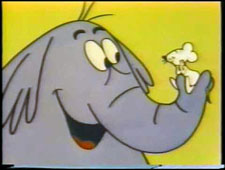 Sidney commences intensive effort on working up an act. He bets there aren’t many elephant jugglers, and starts tossing around six cocoanuts. But when a passing animal asks what he is doing, he loses concentration, allowing all the cocoanuts to painfully conk him. “Looks kinda silly to me”, says the departing animal. Next, tightrope walking. With a rope strung between two palm trees, Sidney steps out onto the wire, carrying a small umbrella in his trunk. The palm trees bend under his weight, depositing Sidney on the ground with a crash. Worse yet, monkeys in each tree begin flinging cocoanuts at him, until he stands up, releasing the wire, and springing both monkeys off into the sky. Sidney turns to his friends for inspiration for a new act. “Why don’t you soak your head?”, says Stanley in his usual sarcastic manner. Sidney takes this literally without insult, and obtains a small pail, which he fills with water, then positions under one of the tallest palm trees, for a high dive into a shallow tank. He climbs to the top of the palm (which fortunately doesn’t bend), and encounters the nest of Mrs. Kookaburra Bird, whose eggs he apologizes for trampling as he assumes a diving position. He dives, while Mrs. Kookaburra can only comment, “Poor Sidney. He’s really flipped his lid this time.” Sidney’s dive is successful – of sorts – but, as he is five times bigger than the pail, he rises with the pail stuck tightly over his face, shouting in a bubbly underwater voice that he is drowning. “Stand back. Here comes the wonder boy”, warns Stanley, as Sidney stampedes into a tree trunk, releasing the pail and his very-much compressed head. Stanley outdoes himself, with a wise crack that even shocks Cleo – “Why don’t you shoot yourself. That’s an act that would please everybody.” Again taking the comment literally, Sidney pours a keg of gunpowder into a hollow log, stops up one end of the log with a boulder, then drops a match into the log and quickly stuffs himself in the open end – an elephant cannonball. But Sidney is wedged too tightly for the powder blast to have any effect in moving him – so instead, the boulder is blasted out of the other end, while Sidney’s rump remains, covered in powder burns. The rock sails through the air, clunking Stanley, and producing a tall lump on his head. Sidney returns to his friends to comment, “I don’t like your ideas, Stanley.” “Don’t like ‘em myself, Sidney”, snarls Stanley, observing hs lump.
Sidney commences intensive effort on working up an act. He bets there aren’t many elephant jugglers, and starts tossing around six cocoanuts. But when a passing animal asks what he is doing, he loses concentration, allowing all the cocoanuts to painfully conk him. “Looks kinda silly to me”, says the departing animal. Next, tightrope walking. With a rope strung between two palm trees, Sidney steps out onto the wire, carrying a small umbrella in his trunk. The palm trees bend under his weight, depositing Sidney on the ground with a crash. Worse yet, monkeys in each tree begin flinging cocoanuts at him, until he stands up, releasing the wire, and springing both monkeys off into the sky. Sidney turns to his friends for inspiration for a new act. “Why don’t you soak your head?”, says Stanley in his usual sarcastic manner. Sidney takes this literally without insult, and obtains a small pail, which he fills with water, then positions under one of the tallest palm trees, for a high dive into a shallow tank. He climbs to the top of the palm (which fortunately doesn’t bend), and encounters the nest of Mrs. Kookaburra Bird, whose eggs he apologizes for trampling as he assumes a diving position. He dives, while Mrs. Kookaburra can only comment, “Poor Sidney. He’s really flipped his lid this time.” Sidney’s dive is successful – of sorts – but, as he is five times bigger than the pail, he rises with the pail stuck tightly over his face, shouting in a bubbly underwater voice that he is drowning. “Stand back. Here comes the wonder boy”, warns Stanley, as Sidney stampedes into a tree trunk, releasing the pail and his very-much compressed head. Stanley outdoes himself, with a wise crack that even shocks Cleo – “Why don’t you shoot yourself. That’s an act that would please everybody.” Again taking the comment literally, Sidney pours a keg of gunpowder into a hollow log, stops up one end of the log with a boulder, then drops a match into the log and quickly stuffs himself in the open end – an elephant cannonball. But Sidney is wedged too tightly for the powder blast to have any effect in moving him – so instead, the boulder is blasted out of the other end, while Sidney’s rump remains, covered in powder burns. The rock sails through the air, clunking Stanley, and producing a tall lump on his head. Sidney returns to his friends to comment, “I don’t like your ideas, Stanley.” “Don’t like ‘em myself, Sidney”, snarls Stanley, observing hs lump.
Sidney comes up with his last idea himself – an elephant trapeze artist. Climbing another tall tree, Sidney prepares to swing out on a vine, when he spots on the horizon the large steamship of the talent scouts. Three scouts in adventurer’s garb (two of which we’ve seen before, as early as episode one of the series) step out on shore from a rowboat. “Yoohoo, fellas. Up here”, calls Sidney from his perch. Sidney leaps off the branch, swinging directly toward the scouts. “Mad elephant – heading this way!” shout the scouts. Sidney scores a direct hit upon them, knocking them down like bowling pins. “Sorry, fellas”, apologizes Sidney – just as the vine snaps. With a scream of terror, Sidney flies out over the ocean, smashing broadside into the ship’s hull. He leaves a gaping hole in the shape of hs svelte silhouette in the side of the ship, and within moments, the vessel has sunk into the bay, leaving only its smokestack visible. Sidney squeezes out the narrow stack with a pop, and remains seated on it, as the disgusted scouts slowly pass in their rowboat, forced to row their way home. “How’d you like my act? Want some more? I can juggle. I can sing. Yankee doodl……Aww, c’mon back!!”, Sidney bawls, for the fade out.
Moving forward in time, next time.


 Charles Gardner is an animation enthusiast who toils by day as a member of LA Law – but by nights and weekends indulges in classic jazz and ragtime as a performer; and studies classic Hollywood cartoons… maybe a little too much.
Charles Gardner is an animation enthusiast who toils by day as a member of LA Law – but by nights and weekends indulges in classic jazz and ragtime as a performer; and studies classic Hollywood cartoons… maybe a little too much.


































































































































































It’s been ages since I’ve seen a Q. T. Hush cartoon, so long that I can’t recall ever seeing one in colour before. This one was a lot better than I remember it being, although watching an entire ten-part episode all in one go is a bit much. I notice that the song “Beautiful Ohio” is played on the organ during many of the circus performances, which may be a clue as to where the story was set. The setting of the opening sequence certainly resembles inner-city Cincinnati, right down to the clock tower on the old City Hall.
Roger Ramjet, like Batfink, was inordinately popular in Australia, running on free-to-air TV well into this century. Don’t ask me why.
Colonel John Ringading North by Northwest Barker III, the circus owner in “The Greatest Shmoe on Earth”, is a takeoff on John Ringling North I, owner of the Ringling Bros, and Barnum & Bailey Circus at that time, who played himself in the Cecil B. DeMille blockbuster “The Greatest Show on Earth”.
There’s a fourth Deputy Dawg cartoon that deserves to be mentioned here: “Peanut Pilferer”, in which an elephant escapes from the Dingbat & Daily circus train to raid Deputy Dawg’s peanut patch. Sadly, this was one of the last productions directed by the great Bill Tytla, who had some prior experience in animating circus elephants.
A nice line-up here. I especially like that “Beany and Cecil” cartoon and have a strange feeling that the show might be re-run again on television sooner or later.
All I can do is echo the other comments and say that I love the group of cartoons mentioned here.QT HUSH has always been a favor of mine as far back as I can remember, perhaps one of the first cartoons. I watched on local television back in the 1960s or late 1950s. So nice to check it out again. The same goes with BEANY AND CECIL! And it is especially nice to read the descriptive elements on these cartoons to bring back so many memories.